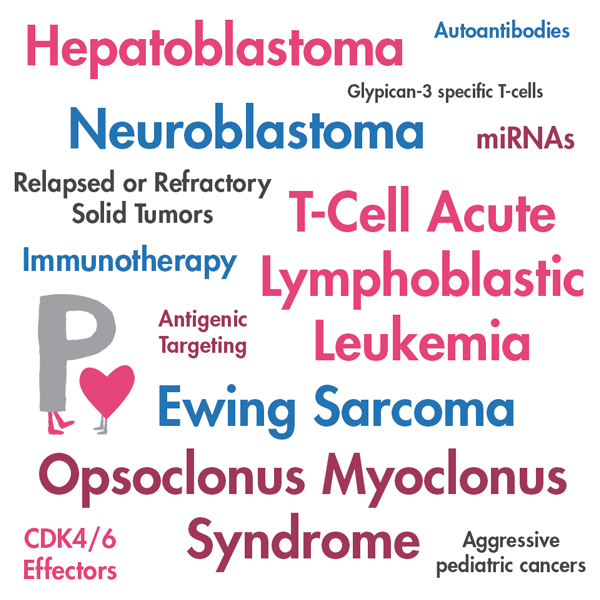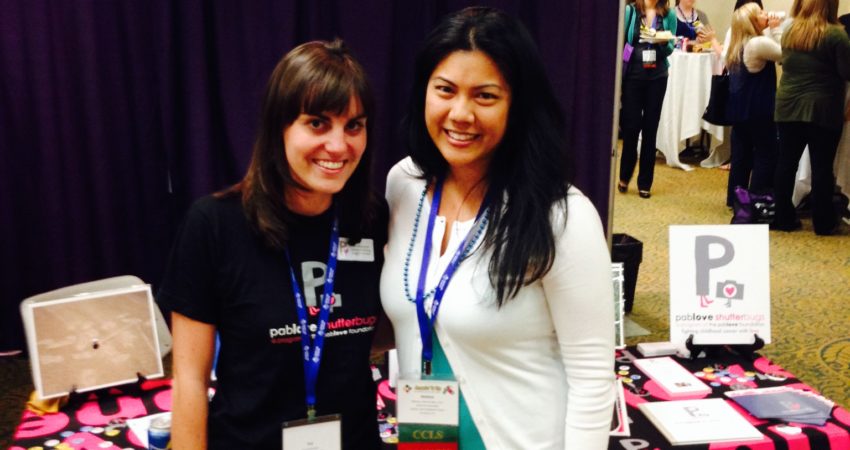Pablove awards record number of Childhood Cancer Research Grants
The Pablove Foundation is proud to announce our 2014 Childhood Cancer Research Grants!
We are awarding $300,000 to six leading cancer research centers worldwide – the most grants we have ever funded in a single year. The Pablove Foundation has now awarded $900,000 to support innovative pediatric cancer research since 2011.
“Childhood cancer is the leading cause of death by disease in children and teens,” says Dr. Leo Mascarenhas, Chair of the Scientific Advisory Committee and Head of the Division of Oncology at Children’s Hospital Los Angeles. “Our 2014 Childhood Cancer Research Grant awards fill me with optimism. As the community of support for The Pablove Foundation continues to grow, so will our ability to invest in bold solutions so children diagnosed with cancer can not only survive, but thrive.”
Our 2014 Childhood Cancer Research Grants will be awarded to:
Glypican-3 specific T-cells for the Adoptive Immunotherapy of Pediatric Liver Cancers
Andras Heczey M.D. of Texas Children’s Hospital/Baylor College of Medicine
Dr. Andras Heczey’s research seeks to develop an effective immunotherapy for rare pediatric liver cancers, including hepatoblastoma and hepatocellular carcinoma. The outcome for these cancers remains poor when doctors are unable to perform surgery on a tumor, or when the cancer has spread through metastasis. Dr. Heczey’s proposal will generate T-cells from a patient’s own immune system to attack the liver tumor cells. The T-cells will be modified to specifically target glypican-3, a protein that is expressed by cancerous cells but not by healthy tissues. The data has the potential to rapidly introduce a new, effective treatment for pediatric liver cancers that can be tested in clinical trials and has the potential to be applied to adults with hepatocellular carcinoma.
Identification and targeting of circulating Ewing’s sarcoma stem cells
Masanori Hayashi, M.D. of Johns Hopkins University
The project by Dr. Masanori Hayashi will focus on identifying the cells that drive growth of Ewing’s sarcoma (the second most common bone cancer in children, adolescents, and young adults). Intensive chemotherapy has improved outcomes for children with localized disease, but the survival rate for kids whose cancer has spread remains dismal. Identifying and targeting circulating Ewing’s sarcoma cells will be the key to preventing and curing disease before it spreads throughout a child’s body. Additionally, Dr. Hayashi will investigate the role of WNT signaling (gene transcription) in modulating Ewing’s sarcoma metastasis by using the LGK974 inhibitor. The research will build knowledge regarding the biology of metastatic disease. The ability to distinguish between patients with previously undetectable residual disease and those with no disease would allow doctors to identify patients who require further therapy, while sparing those who are already cured from unnecessary and potentially toxic treatment.
“I am so honored to be given this wonderful opportunity from The Pablove Foundation to pursue my research,” says Dr. Hayashi, a third year fellow at Johns Hopkins Sidney Kimmel Comprehensive Cancer Center. “I am excited about what I will be able to find and how I can hopefully impact this horrible disease, which would have never been possible without the generous support of The Pablove Foundation.”
Identification of novel cdk4/6 effectors in T-cell acute lymphoblastic leukemia
John Carter, M.D., Ph.D. of the Fred Hutchinson Cancer Research Center at Seattle Children’s Hospital
T-cell acute lymphoblastic leukemia (T-ALL) is a highly aggressive blood cancer in children, and treatment has lagged behind that of the more common pre-B ALL. Dr. John Carter’s research will investigate the inappropriate activation of the CDK4/6 cyclin-dependent kinase in children with T-ALL. This enzyme may contribute to the unchecked proliferation of T-ALL cells. Few validated targets of these CDKs currently exist, and Dr. Carter’s research seeks to identify new methods to restore the checkpoints that would normally guard against growth of T-ALL cells. The proposal represents a novel effort to explain oncogenic mechanisms of this important cancer-relevant biochemical pathway.
miRNAs secreted by tumor associated macrophages and resistance in Neuroblastoma
Muller Fabbri, M.D., Ph.D. of Children’s Hospital Los Angeles
Dr. Muller Fabbri’s research is addressing the challenge of drug resistance in neuroblastoma, which is the most prevalent cancer in infants and most common solid tumor outside the brain in children. Dr. Fabbri is studying a unique communicating mechanism between neuroblastoma tumor cells and cells of the immune system. His preliminary research indicates that tumor cells send signals to immune cells, which in turn respond to the tumor cells by sending back signals to promote cancer survival and resistance to chemotherapy. By interrupting this cross-talk, Dr. Fabbri hopes to discover methods for preventing drug resistance in this difficult disease. The Pablove Foundation’s 2013 Grant to Dr. Fabbri supported the generation of fundamental preliminary data, allowing the researcher to publish a significant paper on the issue in Nature Reviews Drug Discovery. A second year of funding will allow Dr. Fabbri to complete his current investigations and help secure his first R01 Research Project Grant from the National Institutes of Health.
“I feel very privileged and extremely proud to be supported by The Pablove Foundation,” adds Dr. Fabbri. “None of the progress I’ve made so far would be possible without the foundation’s support. I do not possess enough words of appreciation for continuously believing in my science and in our common mission towards saving more children’s lives.”
This year also marks the foundation’s first research awards through a designated fund. Pablove’s designated funds allow advocates to mobilize fundraising around a specific type of pediatric cancer research, as directed by the Pablove Scientific Advisory Committee. Pablove’s Opsoclonus Myoclonus Syndrome (OMS) Fund is the first to reach this milestone, providing the funds necessary for two groundbreaking proposals on a severely under-researched topic.
Detection of novel autoantibodies in children with OMS
Bethan Lang, M.D. of Oxford University
Dr. Bethan Lang’s project will use mass spectrometry to isolate the antigens from antibodies generated by patients with OMS. This knowledge will allow doctors to better target treatment through immunotherapy.
Targets of the Intrathecal B-Cell Response in Pediatric Opsoclonus Myoclonus Syndrome
Gregory Owens, Ph.D. of the University of Colorado School of Medicine
Dr. Gregory Owens is a multiple sclerosis expert lending his insight to OMS through collaboration with OMS authority Michael Pranzatelli, M.D. The project seeks to determine whether antibodies generated by the B-cells in children with OMS are targeting proteins in the brain, and whether that process is directly responsible for causing disease. The proposal has the potential to generate diagnostic implications as well as disease modulation and prevention.
This is the fourth year The Pablove Foundation has awarded Childhood Cancer Research Grants. The foundation has also funded projects at the Mayo Clinic, Roswell Park Cancer Institute, Lombardi Cancer Center at Georgetown University, Sydney Children’s Hospital, Dana-Farber Cancer Institute, Children’s National Medical Center, and Children’s Hospital of Wisconsin/Medical College of Wisconsin.
Read the full press release.


Comments